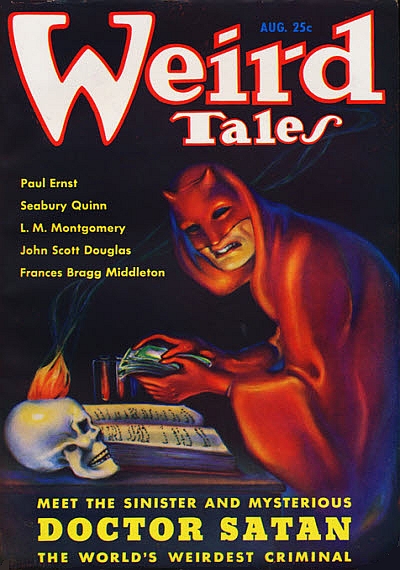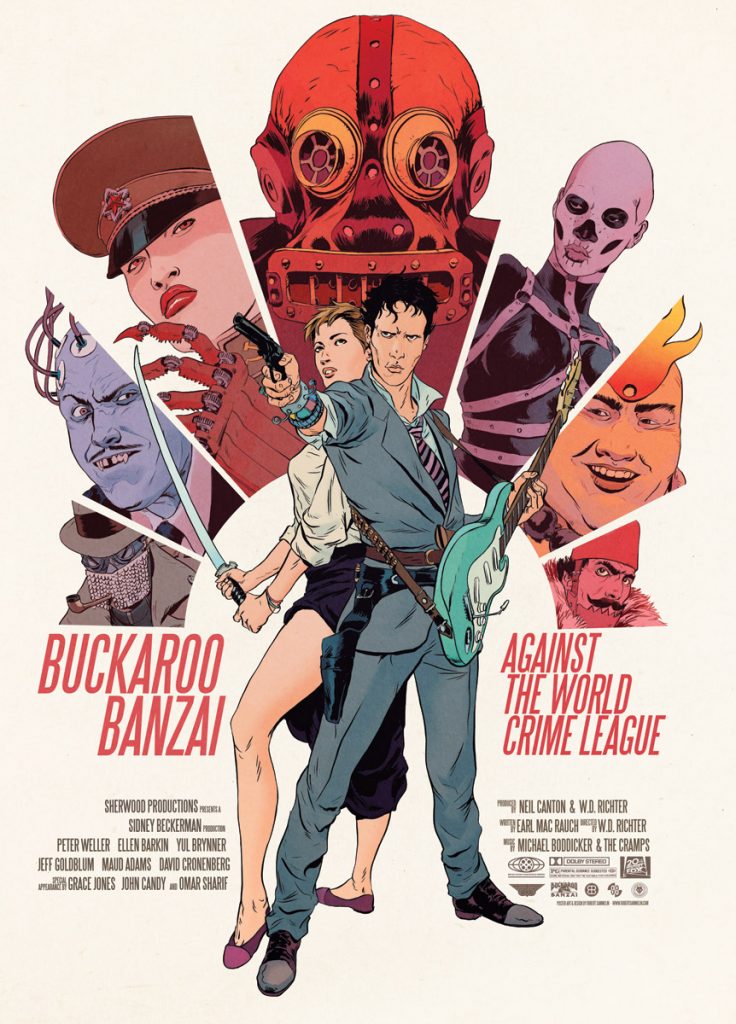
Doctor Satan is also a big hit at children’s birthday parties.
In science fiction and fantasy, whether employing images or words, creators are always looking for big ideas. A killer premise, a brilliant spin on a standard story, or something wholly fresh and unique. And while there are no shortage of movies and books that possess those, it’s not nearly as necessary as one initially believes.
Consider two science fiction movies, both starring Peter Weller. One is a hokey revenge story patterned after the sleazy exploitation films of the 70s. Only instead of a woman brutally killing her rapists, it’s a man enacting bloody vengeance against his murderers, since it’s in a futuristic setting and he is resurrected as a cyborg. But the brutality and fundamental story beats are all the same.
The other science fiction movie was inspired by Doc Savage, with a brilliant Renaissance Man and his organizations around the world contending against several different alien races throughout a variety of locations and dimensions.
On paper, the second idea seems far more appealing and fruitful. And should have made for the far superior film. And yet, Robocop (1987) is a deserved classic and much better picture than The Adventures of Buckaroo Banzai Across the 8th Dimension (1984), even if the latter has its moments and fans.
What accounts for this difference? Execution. In this case, from the director. As much as I hate Paul Verhoeven for his insulting mockery of Starship Troopers, he did a fantastic job with Robocop. It’s gritty, exciting, and conveys the cruelty of its dystopian world. I like exploitation movies, but in telling his story of revenge and internal struggle, Verhoeven reached far loftier heights, closer to that of a Lonewolf and Cub. Robocop’s pacing is terrific, its villains utterly detestable, there are plenty of individually memorable scenes, and even the music theme is catchy.
The same script in the hands of an average director would have become forgettable trash. Verhoeven elevated it far beyond its source material.

Clearly, a movie that inspires a fan to make a fake poster this cool can’t be all bad.
What happened to Buckaroo Banzai? Why, the exact opposite! W. D. Richter was an experienced Hollywood screenwriter, but it was his first and only time directing a movie. And boy did it show. Scenes feel flat and lack impact even during big moments. This includes character deaths, which feature no changes in music or the camera perspective. The pacing and editing is uneven. Certain scenes should have been shortened or scrapped entirely. Others should have been built up and extended. One can’t blame the actors, either. Weller is a good lead, Ellen Barkin is a sexy love interest, Christopher Lloyd has a fun role, and John Lithgow is a wonderfully kooky, magnetic villain, despite how poorly his scenes are set up. The end result is that what would have been a science fiction classic in the hands of a good director is instead a decent oddity people remember as much for its music video ending credits as for anything else in it.
The same principle applies to books. Okay, a Lovecraft had a tremendous imagination, with many novel ideas, and a Dune was chock full of them. But were there any original plot ideas in the works of the writer I glowingly profiled last week, Rafael Sabatini? No. He simply executed tales of adventure in historical settings in as vivid and exciting a manner as I’ve ever come across, with excellent protagonists. What about Robert E Howard’s Conan stories? There are some decent fantasy ideas in his world, to be sure, but nothing that many other forgettable writers didn’t also come up with. The difference is that Howard was a master storyteller, expertly weaving his descriptions with action, and created an iconic, fantastic hero. Or what about the Heinlein juveniles? I love them, but in terms of science fiction ideas, they’re quite basic. But yet again, the execution is what sets them apart. They’re great adventures with likable, relatable characters, amusing dialogue, and Heinlein’s theme of self-improvement done exceedingly well.
Clearly, fantastic ideas not only aren’t enough by themselves, but oftentimes aren’t necessary at all. This, incidentally, is part of what so many people thumbing their noses at the pulps miss. There isn’t an ingenious concept, so they assume it must be simplistic, juvenile junk anyone can write. But on the contrary, writing an absorbing adventure story is immensely difficult, and a tremendous accomplishment! The devil is all in the execution.
W.D.Richter also wrote the screenplay for “Big Trouble In Little China”, I’m so glad Carpenter directed that one instead of Richter!
“Big Trouble” was a simple story perfectly executed (it was written to be a western). “Buckaroo Banzai” was a simple story poorly executed.
That said I do have a great deal of affection for Buckaroo Banzai, despite it’s many flaws.
Robocop is a great film. In many ways, though, I prefer Buckaroo Banzai. Sure, it’s flawed. But man, that movie has PERSONALITY.
The sad thing is Robocop and Banzai should have made Peter Weller a top tier action/sff actor between them. Instead, his career, though busy, has been more of an oddity like Banzai is.
-
The thing about Buckaroo Banzai is that it’s the type of movie you need to see multiple times to really get how densely packed it is. It rewards repeat viewings like crazy, although it is true that Richter’s flat, style-less direction isn’t enticing to a casual viewer.
-
Well he took time off tonpursue a doctorate in archaeology. I guess after Bukaroo his carrer tanked so badly he had to pursue another career. Although he’s popped up here in there. I think I saw him in a commercial for the Last
xavier
Love both movies! And yes, the BB credit sequence is awesome. The ten year old kid in me still gets excited, just like I did back then, when I hear it.
After reading this article, I looked up BB and the World Crime League and there’s good news and bad news:
Good News: MGM has greenlit a BB TV series.
Bad News: Kevin Smith is at the helm and plans to act in it…
Ugh.